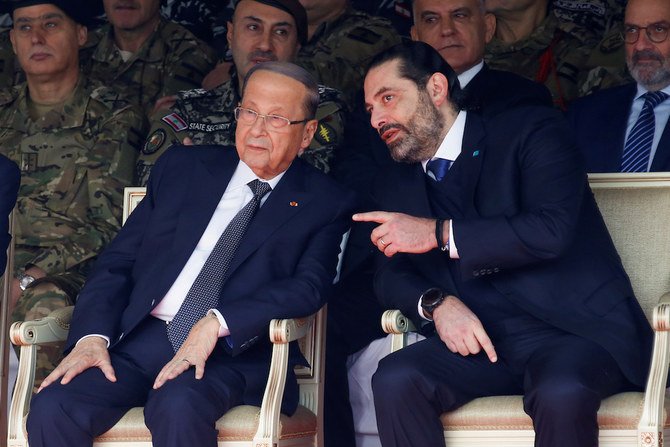
- ARAB NEWS
- 13 Jul 2025

Najia Houssari
BEIRUT: Caretaker Prime Minister Saad Hariri announced that he will not be a candidate to be prime minister of a new government during the binding parliamentary consultations that are scheduled to take place on Thursday.
His statement brings the issue of government formation back to square one, 50 days after the Hariri government resigned over the street protests.
Hariri believes that he heads a technocrat government, while President Michel Aoun and his party, the Free Patriotic Movement — as well as his allies Hezbollah and the Amal Movement — insist on a techno-political government. Hezbollah and Amal have stuck to Hariri’s nomination as prime minister, with Hezbollah’s Secretary-General Hassan Nasrallah calling on Hariri to reconsider his terms.
Hariri’s decision caused confusion among the political parties, even though some of them did not intend to name him in the consultations that the president is conducting.
Hariri asked last Monday to postpone the consultations for further political deliberation in light of the decision of the Lebanese Forces not to name him as a candidate to be a new prime minister.
The Free Patriotic Movement had previously announced that it would refrain from participating in the nomination of the prime minister and that it would not participate in the government through ministers. This meant the absence of the Christian voice in nominating Hariri.
Dar Al-Fatwa, the supreme religious authority of the Sunni community in Lebanon — to which the prime minister is supposed to belong in accordance with the constitution — announced that its candidate for prime minister is Hariri.
Hariri said that “since I submitted my resignation 50 days ago in response to the call of the Lebanese, I have strived to meet their demand of a technocrat government, and I saw that it is the only one capable of dealing with the serious social and economic crisis our country is facing.
“When it became clear to me that, despite my categorical commitment to forming a technocrat government, the positions that have emerged in the past few days regarding the issue of my nomination are positions that are unchangeable.”
Director of the Information Office at the Presidential Palace Rafik Shalala told Arab News that the parliamentary consultations “are still on time and there are contacts during the night to try to agree on an alternative name for Hariri.”
The Future Parliamentary Bloc held a meeting on Thursday morning an hour before the consultations “to determine its position on the issue of nominating the person who will be assigned to head the government.”
The consultations stipulate that the president must be informed by the MPs of the name that they consider suitable to head the government. The appointment is decided based on the name that gets the most votes. The president, after consultation with the speaker of the Parliament, shall summon the person and assign him the task, so that the prime minister-designate shall, in turn, conduct non-binding consultations with MPs regarding the ministers who make up the government.
In the event that the overnight contacts do not result in an agreement on an alternative name, the consultations will be postponed for the third time.
Amid the constitutional chaos, the Lebanese Army have taken exceptional measures in all regions, but most especially in the streets leading to the parliamentary buildings in central Beirut.